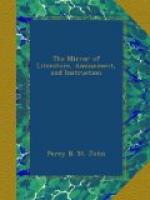Sometime afterwards the mother of the boy came to be made acquainted with what had happened to him, and she caused a letter to be sent to his foster father, wishing her child to be given up to her; her application was attended to, expressing much pleasure at being able to restore the boy to her, but stated that he was doing well, and in good hands, they were reluctant to part with him; and to induce his mother to suffer him to remain where he was, she was informed that his protector had made his will, and upon his demise, had left the whole of his property to the child. All this had no weight, she demanded her son, and the little fellow was afterwards given up, with many tears and regrets by his foster parents, to his mother, at Liverpool. It would be well could the narrative break off here in the manner it could be wished. But soon afterwards, upon the return of the boy with his mother to their home, playing with some children in the neighbourhood of Oakland Carding Manufactory, near Llanurst, he unfortunately fell into a small sheet of water and was drowned before any assistance could be rendered him.
Paddington.
J.N.J.
* * * * *
THE NATURALIST.
ANECDOTES OF A TAME HAWK.
(By a Correspondent of the Magazine of Natural History.)
About three years since a young sparrowhawk was purchased and brought up by my brother. This was rather hazardous, as he, at the same time, had a large stock of fancy pigeons, which, in consequence of their rarity and value, he greatly prized. It seems, however, that kindness and care had softened the nature of the hawk, or the regularity with which he was fed, rendered the usual habits of his family unnecessary to his happiness; for, as he increased in age and size, his familiarity increased also, leading him to form an intimate acquaintance with a set of friends who have been seldom seen in such society. Whenever the pigeons came to feed, which they did often-times from the hand of their almoner, the hawk used also to accompany them. At first the pigeons were shy, of course; but, by degrees, they got over their fears, and ate as confidently as if the ancient enemies of their race had sent no representative to their banquet. It was curious to observe the playfulness of the hawk, and his perfect good nature during the entertainment; for he received his morsel of meat without that ferocity with which birds of prey usually take their food, and merely uttered a cry of lamentation when the carver disappeared. He would then attend the pigeons in their flight round and round the house and gardens, and perch with them on the chimney-top, or roof of the mansion; and this voyage he never failed to make early in the morning, when the pigeons always took their exercise. At night he retired with them to the dovecote: and though for some days he was the sole occupant of the place, the pigeons not having




